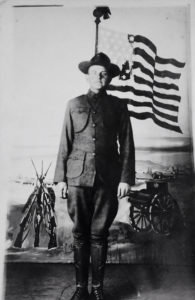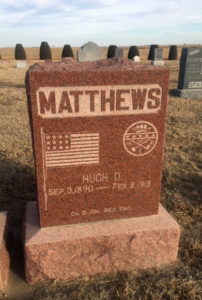Because World War I soldiers and sailors are often forgotten, this blog is an effort to remember their service and sacrifice. One hundred years ago today, February 8, 1918, this area had its first casualty. Hugh Matthews died at Camp Doniphan in Oklahoma (now part of Fort Sill).. The February 14 issue of the Graphic reported it this way:
“The death of this young man brings the war closer to us, especially to those of us who have sons in the army, for he was the first to return to us stilled in death and we cannot but wonder who will be next.”
It had been reported the week before that Hugh was ill with pneumonia and that his brother John had gone to Camp Doniphan to be with him. When Hugh died, John accompanied his body on the train back to Kinsley.
“They were met here by many friends, and escorted to the city limits by the Home Guard. The body was taken to the old home near Crescent, south of this city, and the funeral was held at Bethel the following afternoon, and the remains were laid to rest in the Parkhurst cemetery escorted by a firing squad from the Home Guard of this city, the Home Guard of Mullinville, and the many hundreds of friends and neighbors.”
Hugh had been born September 3, 1890 in Green County, Tennessee to Mary Ann (Haun) and W. T. Matthews. Around 1911, the family had come to the Crescent community (also called Bethel) which was located due south of Kinsley on 17th Avenue at the Edwards/Kiowa County line. I found a couple items about Hugh in the local newspapers which show him to have the typical interests of a young man. In December 1912 the Graphic wrote: “There is considerable complaint because Hugh Matthews went off on a visit to his old home in Tennessee, without bidding his best girl goodbye, however he sent back word that he would not stay very long.” In December, 1916, the Kiowa County Signal reported that he had purchased a new Ford. He was a member of the Modern Woodmen of America. Hugh continued to live with his family until he enlisted in the army on September 21, 1917. He was a member of the 110th Engineer Regiment and was in training at Camp Doniphan when he contracted pneumonia.
The Graphic article continues to describe his funeral: “The concourse was so great that the church building was far too small, but it was a beautiful day and so the services were held out of doors. Elder A. S. Allphin of Pawnee Rock, an old friend of the family, stood on the steps of the church while in front of him was placed the casket, containing all that was left of a fine soldier lad, draped with the stars and stripes and covered with a wealth of beautiful flowers. There were fully fifteen hundred people present to show by their presence their high regard and affection for the deceased and his family, and Mr. Allphin’s funeral address touched the hearts of his hearers and was a source of comfort and consolation to Hugh’s relatives and friends.”
Hugh was survived by his parents, W. T. and Mary Ann Haun Matthews and nine brothers and sisters.
“That there will be many similar occasion we cannot doubt, as we watch the storm clouds of war darken our horizon, and we can but pray and hope that we may be spared the great personal loss and sorrow that has come to our friends in the death of a loved son and brother.”


Hugh Matthews Bethel Cemetery
